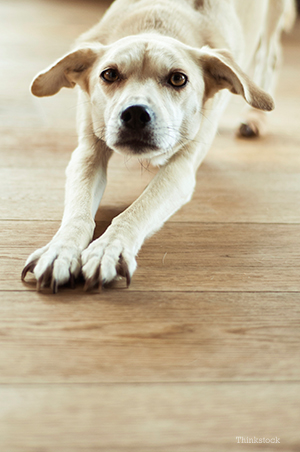
AJ Debiasse, a technician in Stroudsburg, PA, contributed to this article.
Repeated bladder infections can be a quite frustrating in female dogs. Strangely enough, rather than antibiotics, the treatment for frequent bladder infections may be surgery. Why? Get ready for a very sensitive discussion about a very sensitive area: the vulva.
How does the vulva cause bladder infections?
Some female dogs have extra skin covering their vulva. There are many names for the condition, including:
- Redundant vulvar folds
- Vulvar fold dermatitis
- Recessed vulva
The condition occurs mostly in overweight, female dogs and can happen at any age. Excess skin causes friction and small amounts of trauma to that area. This is uncomfortable or at the very least annoying. It usually induces dogs to lick the area - only making it worse.
The excess skin also acts as a pocket where urine becomes trapped. Constant moisture, combined with darkness and body heat is the perfect environment for bacteria to thrive. This can cause infection of the skin itself or an infection that travels from the skin up through the urethra and into the bladder. In addition, it can lead to a pretty bad smell.
What are the signs of bladder infections?
Depending on the severity and the individual pet, signs of repeated urinary tract infections may vary. They can include:
- Licking of the vulva
- Scooting of the hind end
- Bloody urine
- Loss of bladder control (a.k.a. urinary incontinence)
Because other conditions can cause similar signs, it is very important that you have your veterinarian rule out spinal disease, pelvic bladder (where the bladder is located in the pelvis instead of the belly), ectopic ureters (where the ureters open below their normal location), bladder stones, hormone imbalances (urethral sphincter mechanism incompetence) and even bladder cancer.
Diagnosing vulvar fold dermatitis
Diagnosing excessive vulvar skin folds is very simple, but it could be overlooked if not being considered. Excess skin can be seen on a simple physical exam by simply lifting your dog’s tail (if she has one!).
Treating vulvar fold dermatitis
Conservative treatment may be performed, but it can be quite frustrating because we are not treating the cause. Antibiotics and cleaning of the area can treat the infection, but the relief is usually short-term. The best treatment is to surgically remove the excess skin around the vulva. The end goal is to provide better ventilation to the area.
Treating with surgery: vulvoplasty
Before anesthesia and surgery, blood work, a urinalysis and a bacterial culture (a sterile swab) are typically performed. The reconstructive surgery is called episioplasty or vulvoplasty. The main challenge is to remove exactly the correct amount of skin: not too much and not too little— this makes the surgery an art as much as a science.
Not removing enough skin will lead to similar, albeit decreased signs. Removing too much skin may cause opening of the incision because of excessive pressure along the stitches. Such frustrating complications are avoided with experience. Either your family vet or a board-certified surgeon can perform the procedure.
Recovery typically takes two weeks. A use of an Elizabethan collar (plastic cone) will prevent your pet from delaying healing by licking the surgical area. Pain medications and antibiotics will be prescribed. Excessive activity (running, jumping) of the patient should be avoided for about two weeks. Depending on who does the surgery, there may or may not be stitches (sutures) to remove. Regardless, the area should be rechecked to confirm proper healing.
Overall, this is a common and frustrating condition. Treatment is typically highly successful with surgery. Overall, most dog guardians are very happy with the end result.
Questions to ask your vet if your dog has repeated bladder infections:
- Could my dog have too much skin over her vulva?
- Shouldn’t that be fixed?
- Who is the best person to perform the surgery?
If you have any questions or concerns, you should always visit or call your veterinarian -- they are your best resource to ensure the health and well-being of your pets.
